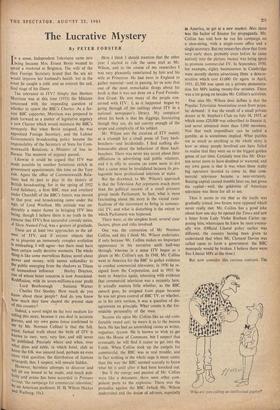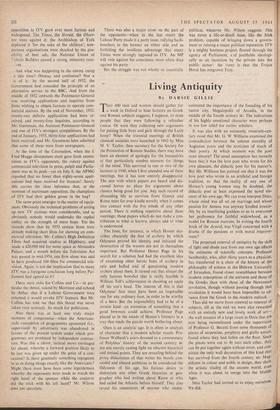Russia and the West under Lenin and Stalin. By George
F. Kennan. (Hutchinson, 40s.)
that anyone claiming the right to influence our opinions should nourish ignorance or delusion about one of the most important factors—Soviet motivations. It is hardly any longer just an in- tellectual scandal, but has become also a moral one, that there are more or less reputable com- mentators who have not bothered about the facts, when the only conceivable extenuation is that, though these are available, they are not easily available. When a book like Mr. Kennan's ap- Pears it knocks out even this miserable excuse.
It was an earlier George Kennan who so effec- tively exposed Tsarist oppressions in Siberia, and the present book is rooted in decade after decade of profound and direct knowledge of Russia. Mr. Kennan has attained his enormous authority, even among those who disagree with him, by his long struggle (in and out of the US Foreign Service) to get the Americans to accept a cool, sane and liberal policy toward the Soviet Union : one which burkes neither of the main facts—the basic hostility of the Soviet regime and the neces- sity of living with it. Such views were and are not acceptable to either wing of the mytho- Maniacs—the McCarthyites and the appeasers.
Mr. Kennan's powerful candour about Western errors, as much as about Soviet myths, is not the wisdom of hindsight, but the wisdom of the man who has learnt. On Rapallo, with its 'amateurism, complacency, and disunity' which became a permanent feature of Western diplo- macy vis-a-vis the USSR; on the Intervention, with the absurd Soviet myths still circulating about it; on Roosevelt's misunderstanding of Stalin, and Stalin's of Hitler, he is continually illuminating. It is often the illumination of an unabashed open-mindedness, which makes one wonder that no one had thought of it before. "Ow penetrating, for example, is his suggestion that for Stalin Trotsky was the real enemy and Hitler a notional bugaboo to combat whom he had made no real preparations. A splendid achievement of Kennan's is that he gets into perspective the reluctance many quite serious and intelligent observers have shown in recent decades to look at politics proper, rather than sociological and economic generalities. The actual behaviour and motivation of parties and governments, particularly those of the Soviet bloc, is now the decisive (though not, of course, the
nil') factor in world affairs. When Tolstoy made his famous remark that what he most greatly feared was a Genghiz Khan with a telephone, he was being perceptive indeed. But he missed another modern invention (or re-invention)— totalitarian ideology. It became technically pos- sible for determined groups to impose abstract solutions on recalcitrant social and economic _tendencies. The real danger is not, as Mr. Kennan is careful to point out, that ideocracy Operates in a vacuum, but that it is as powerful as, and often more powerful than, circum- stances supposedly more objective. Once the USSR is looked on as a mere social congery, real international problems seem to disappear. Ideas, the bureaucrats who are ridden by them, and above all the central qbsession of messianic orld power, alter the picture.
But while clear on this essential, Mr. Kennan regards it as equally important that the realities of Soviet internal and international circum- stances continually modify and often obstruct the effects of the basic motivation. Speaking to his
Certain of Mr. Kennan's views are disputable. But he is concerned, essentially, more with a stance than with a detailed policy. He stands for sanity and knowledge in a situation in which ignorance and hysteria have shown remarkable stamina. Is he urging more good sense than is possible for a democracy? One hopes not, for it is in his sort of thinking that we find the realistic possibility of peace.
ROBERT CONQUEST
Mirror for Captains
Wavell : Portrait of a Soldier. By Bernard Fer- gusson. (Collins, 12s. 6d.)
THE valet's-eye view of a hero is notoriously disenchanting. Brigadier Fergusson, first as an. ADC and later in various more or less personal staff appointments, had, on and off for sixteen years, what was almost a valet's-eye view of Wavell; 'Yet in my eyes his stature grew greater and greater.' In this short, delightful and often moving memoir he has produced not so much a portrait of the Field-Marshal (whose official biography is in preparation) as a snapshot album which I believe many to whom Wavell is only a legend, or less, will peruse with pleasure
It is agreeable, thought slightly disconcerting, to get a glimpse of the Aldershot of twenty-five years ago, the Aldershot where Miss Joan Hunter Dunn played tennis and Wavell gained a reputation for successful unorthodoxy as a divisional commander. The British Army's trans- port was still largely horse-drawn; only a few experimental infantry units were equipped with anything more lethal than a machine-gun; a subaltern drew £230 a year, a major-general £1,100. The Army, accoutred for charades, was rehearsing for melodrama; and some of those who were to play the leading parts brought their misgivings to Wavell. 'Young as I was,' writes his then ADC (momentarily forgetting his grammar), It was obvious that Wavell's con- temporaries were looking to him as something of a prophet.' Dill, Gort and Alan Brooke were regular visitors. 'Wavell listened and said "I see," rather than spoke much; but I realised that they, like I, felt him as a prop.' He was never any good at pulling strings or thumping tables; but his support and advice were worth something to those who—like Dill and Alan Brooke—had to stand up for the Army's interests in Whitehall.
The war came, and Fergusson was with Wavell in the Middle East while his star rose meteori- cally over Libya only to fall in the ,Egean. Wavell seemed equally unaffected by either turn of fortune, and took his supersession by Auchin- leek without batting an eyelid. Here one of Fer- gusson's snapshots assumes for the historian more than a background importance, for he tells the story, known I think to very few, of the British • Somaliland telegram, which seems to have been one of the niggers in the enig- matic, inauspicious woodpile of Wavell's rela- tions with Churchill.
British Somaliland became, after the French next door disinterested themselves, not only un- tenable but, hardly worth holding. Wavell was in London for consultations when the Italians moved against it; all he could promise Churchill, who urged a last-ditch stand, was that the terri-
August Books
Frank Davis
inexpensive antiques at a glance THE PLAIN MAN'S GUIDE TO SECOND-HAND FURNITURE Illustrated 161-
Richard Condon
the explosive new novel by the author of 'The (11,1tic1)irrian Candidate'
SOME ANG111 ANGEL 21/7
Elizabeth Avery
c,periences ofa private
nurse
NURSE HAS FOUR CAI s 15/-































 Previous page
Previous page